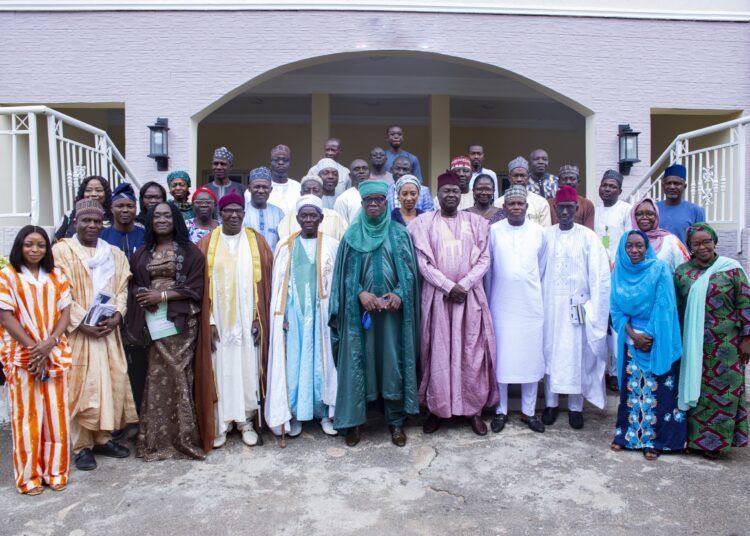The Africa Human Capital Development Plus has reiterated its commitment to prioritising girls’ education and skill development and returning out-of-school children in Nasarawa State to classes.
Speaking in Lafia on Wednesday at a stakeholder’s engagement involving top government officials and traditional rulers in the state, the Chief Executive Officer of Africa HCD Plus, Finda Koroma, said the objective of the organisation was to ensure that every girl-child gets the necessary knowledge and exposure to make them relevant in the society.
Koroma, who was represented by the organisation’s Head of Finance and Administration, Margaret Omanibe, described the alarming rate of out-of-school children in the state as a “ticking time bomb” and urged the stakeholders to intensify efforts to ensure that every child receives a quality education to avert future threats across communities in the state.
She mentioned the five critical pillars of the Africa HCD Plus: Health and Health Security, nutrition and Food Security, education, Skills Development and Labour Participation, entrepreneurship, Financial Inclusion and Digital Economy, and Gender Transformative Human Capital Development.
Koroma said, “Our presence here today demonstrates our continued commitment to supporting the states of Nasarawa, Kano, Kaduna and Lagos in consolidating and scaling up efforts to improve Human Capital Development outcomes in the respective jurisdictions.
“Our data shows Nigeria is among the world’s 20 nations with the most out-of-school children, estimated in the millions, with more female incidences than male.
“The negative implementation the Almajiri system has for preparing children for future productivity is our particular concern. This system has often resulted in children being marginalised from mainstream education due to insufficient resources, lack of formal curriculum and social, economic challenges.”
She further narrated that gender disparities had persisted in the access to education of girls, who most times face unique challenges such as early marriages, household responsibilities and cultural biases in favour of the boys.
While expressing gratitude to the Federal Government of Nigeria for its support in ensuring the success of the Human Capital Development agenda in the country, Koroma said a multiple indicator cluster survey from 2021 had suggested that a percentage of women between the ages of 20 and 24 marry before age 15 in Nigeria, adding that the issue was a matter of great concern to the organisation.
For his part, the Nasarawa State Deputy Governor and Chairman of the state’s Human Capital Development Agency, Dr Emmanuel Akabe, explained that the HCD was a top priority of Governor Abdullahi Sule-led administration.
Dr Akabe, who was represented by the agency’s Director General, Habiba Balarabe Suleiman, pointed out that to reach many residents across the 13 Local Government Areas of Nasarawa State, the agency had expanded its thematic areas to six, which include Health and Nutrition, education, Labour Force Participation, youth, Social Development, and Local Government and Community Development.
He expressed confidence that human capital development will improve the education and empowerment of many residents, including girls, in the shortest possible time.
He said, “The issue of out-of-school children needs to be resolved as soon as possible. When we talk about out-of-school children, we are talking about a huge number of people who still need to receive formal education and the necessary skills.
“For the girl child, we understand that some of the challenges they are facing have some traditional or religious colourations, whether they are properly presented or misconstrued, we need to unravel them so that we can have a society where every one of us has an equal platform to contribute and receive from the society.”
Dr Akabe further thanked Africa HCD Plus for its gracious grant of 30,000 dollars to implement the agenda in the state.
“I want to assure you (Africa HCD Plus) that we have been able to move to a higher level. We have been able to meet several stakeholders and carry out advocacy visits, and what I can tell you is that the responses we have received are quite encouraging. They are beginning to show their impacts,” he added.
Also speaking, the Consultant of Africa HCD Plus, Maryam Uwais, highlighted the adverse effects of early marriages on girls’ education and urged the stakeholders to advocate for policies that delay marriage until the girls are better prepared mentally and physically.
“There are so many things that come from early marriages that we don’t realise. Marriage deferred does not mean that there won’t be marriage. It is mainly to ensure better homes for the girls. So, we need to start advocating for girls to develop so they can earn a decent living and support the family,” she said.
Earlier, the Emir of Lafia, Justice Sidi Bage (rtd), who was represented by the Ubangari Lafia, Usman Isa Baba, affirmed the Emirate’s commitment to supporting initiatives focused on reducing the number of out-of-school children in the state.
Our correspondent reports that during the stakeholder engagement, participants, including Busayo Raymond Ayinde from the Federal Ministry of Education’s Basic Department, expressed their gratitude to Africa HCD Plus for working towards addressing the educational needs of the country’s vulnerable populations.











